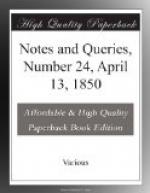“Mark! where his carnage and his
conquests cease!
He makes a solitude, and calls it—peace!”
Engaged this morning in a more legitimate study, that of Tacitus, I stumbled upon this passage in the speech of Galgacus (Ag. xxx.),—
“Ubi solitudinem faciunt, pacem adpellant.”
Does not this look very much like what we call “cabbaging?” If you think so, by adding it to the other plagiarisms of the same author, noted in some of your former numbers, you will confer a great honour on
A SCHOOLBOY.
The Pardonere and Frere.—If Mr. J.P. Collier would, at some leisure moment, forward, for your pages, a complete list of the variations from the original, in Smeeton’s reprint of The Pardonere and Frere, he would confer a favour which would be duly appreciated by the possessors of that rare tract, small as their number must be; since, in my copy (once in the library of Thomas Jolley, Esq.), there is an autograph attestation by Mr. Rodd, that “there were no more than twenty copies printed.”
G.A.S.
Mistake in Gibbon (No. 21. p. 341.).—The passage in Gibbon has an error more interesting than the mere mistake of the author. That a senator should make a motion to be repeated and chanted by the rest, would be rather a strange thing; but the tumultuous acclamations chanted by the senators as parodies of those in praise of Commodus, which had been usual at the Theatres (Dio), were one thing; the vote or decree itself, which follows, is another.
There are many errors, no doubt, to be found in Gibbon. I will mention one which may be entertaining, though I dare say Mr. Milman has found it out. In chap. 47. (and see note 26.), Gibbon was too happy to make the most of the murder of the female philosopher Hypatia, by a Christian mob at Alexandria. But the account which he gives is more shocking than the fact. He seems not to have been familiar enough with Greek to recollect that [Greek: haneilon] means killed. Her throat was cut with an oyster-shell, because, for a reason which he has very acutely pointed out, oyster-shells were at hand; but she was clearly not “cut in pieces,” nor, “her flesh scraped off the bones,” till after she was dead. Indeed, there was no scraping from the bones at all. That they used oyster-shells is a proof that the act was not premeditated. Neither did she deserve the title of modest which Gibbon gives her. Her way of rejecting suitors is disgusting enough in Suidas.
C.B.
Public Libraries.—In looking through the Parliamentary Report on Libraries, I missed, though they may have escaped my notice, any mention of a valuable one in Newcastle-on-Tyne, “Dr. Thomlinson’s;” for which a handsome building was erected early last century, near St. Nicholas Church, and a Catalogue of its contents has been published. I saw also, some years ago, a library attached to Wimborne Minster, which appeared to contained some curious books.




